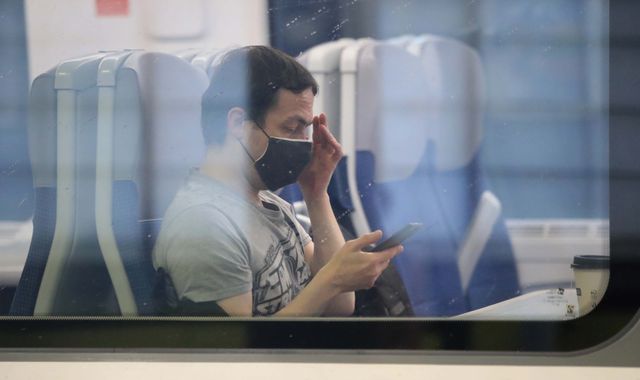FGM: Survivors tell their stories as female circumcision referrals drop during pandemic
Written by News on 25/02/2021
Survivors of female genital mutilation (FGM) have spoken out about their horrifying and painful experiences in the hope their stories will prevent it from happening to others.

Performing FGM, also known as female circumcision or cutting, as well as taking girls abroad for it is illegal in the UK but more than 6,400 women and girls were affected from April 2018 – March 2019 in England, NHS Digital figures show.
Since the pandemic, the numbers of women and girls being referred to the NHS with FGM has dropped.
As the practice is so secretive it is not known whether that is because it is still happening but as schools are closed teachers cannot pick up on it, or whether the lack of overseas travel means it is happening less as girls are often taken abroad for it.
FGM is not required by any religion but many communities from Africa, the Middle East and Indonesia believe it will benefit a girl in some way, for marriage or childbirth. It is often carried out by women and without any anaesthetic.
Two survivors spoke to Sky News about their experience and why it is important to keep talking about it, even if it is psychologically and physically painful.
Hadas: ‘I had no idea I’d been trafficked or had FGM performed on me’
Hadas, not her real name, was only a few months old when her mother used her father being away on business to get her cut in Eritrea, where she is from.
The 26-year-old, who lives in London now, constantly had infections and was in a lot of pain every time she had her period while growing up – but she did not know why.
She was trafficked to Europe when she was 16-years-old by a man she thought was a family friend who wanted to help get her a better life.
The man was taking money for people to have sex with her but after managing to cross the Channel from Calais a woman helped her escape “in just my flip flops and pyjamas”.
It was not until a social worker referred her to the NSPCC that she found out she had been trafficked and had FGM explained to her, for which she had to have surgery.
“Up until then, I had no idea,” she said.
“Naomi from the NSPCC changed my life the day I opened up to her and she took me to a doctor.
“I still have a bit of pain but I can live with it – it’s always going to be painful, also emotionally.
“You can’t have a normal relationship after that, I couldn’t have sex for six years and I don’t think I’ll end up with anybody Eritrean.
“I’m in touch with my mother who’s now in Sudan but I haven’t told her, I can’t.
“Nobody talks about FGM or sexual intercourse, it’s a closed subject in Eritrea but if they just had enough knowledge, they wouldn’t consider doing it – that’s why it’s so important I speak about my experience so others don’t have to go through it.”
Salimata: ‘I thought I was going to a picnic but then I heard screaming’
Salimata Badji Knight, who lives in the UK, has helped save about 50 girls from FGM after her experience made her want to speak out.
She had FGM performed on her when she was four and a half years old after being told she was going for a picnic with her grandmother in western Senegal while on holiday there from Paris.
“I was very excited for the picnic and before I knew it one of the young girls I was with, from my age to 15, was taken away and all I could hear was screaming,” she said.
“We knew it wasn’t a happy scream and we didn’t know what was happening.
“I was one of the last ones and when it was my turn, I was pinned down on the floor, I was kicking and biting and before I knew between my legs hurt a lot.
“I didn’t understand at that age and nobody spoke openly about your anatomy.
“We were all crying, I could see the adults did not look happy afterwards but there was a celebration of us going into womanhood, although I was only four.
“It was confusing because it hurt but then you were more accepted in the community.”
Ms Knight only realised FGM was not normal when she was a teenager and asked her French school friends when they were circumcised.
“They had no idea what I was talking about, their faces were confused, that’s when the pin dropped for me that this doesn’t happen everywhere – it hit me hard,” she said.
“My concept of being a French girl, living in Paris, loving fashion, it was like a new narrative of my life and it’s taken a long time for me to understand and channel my anger.
“The hardest thing was to not hate my mother or my community, because at the end of the day it’s behind me and I had to manage how I was seen at school from then but you can never forget how painful it was.”
Being circumcised has affected her relationships with people, she said, and she is always questioning what someone’s “true intentions” are.
But, she added: “I am a victor, not a victim and knowing I was different from my friends made me fight more and made me want to help others who this has happened to, or could happen to.”
If you are worried a child is at risk of or has already had FGM, call the NSPCC’s anonymous FGM helpline on 0800 028 3550 or email fgm.help@nspcc.org.uk.
If you think a girl or young woman is in immediate danger of FGM you should call the police on 999. You should also contact the Foreign and Commonwealth Office if she has already been taken abroad.
(c) Sky News 2021: FGM: Survivors tell their stories as female circumcision referrals drop during pandemic







